Lease Offer Letter
[Your Name]
[Your Address]
[City, State, ZIP Code]
[Email Address]
[Phone Number]
[Date]
[Recipient's Name]
[Recipient's Address]
[City, State, ZIP Code]
Subject: Lease Offer Letter for [Property Address]
Dear [Recipient's Name],
I hope this letter finds you well. I am writing to extend a lease offer for the property located at [Property Address]. After carefully reviewing your application and references, we are pleased to offer you the opportunity to lease the aforementioned property under the terms outlined below:
1. Property Details:
- Property Address: [Property Address]
- Type: [Apartment/Condo/House]
- Rent Amount: [$XXX] per month
- Lease Duration: [Start Date] to [End Date]
- Security Deposit: [$XXX]
2. Lease Terms and Conditions:
- Monthly Rent: The monthly rent of [$XXX] is due on the [1st/15th] day of each month.
- Security Deposit: The security deposit of [$XXX] is refundable and will be held in accordance with local laws.
- Utilities: [Specify whether utilities are included or not]
- Maintenance: The landlord will be responsible for [list maintenance responsibilities, e.g., repairs, landscaping].
- Pets: [Specify if pets are allowed and any associated fees or restrictions].
3. Move-In Details:
- Move-In Date: [Move-In Date]
- Key Exchange: Keys will be provided on the move-in date after all required payments are made.
Please review the terms and conditions outlined in this offer letter carefully. If you decide to accept this lease offer, please provide your written confirmation by [Confirmation Deadline Date]. You can reach me at [Your Phone Number] or [Your Email Address] for any clarifications or to discuss any modifications to the terms.
To confirm your acceptance, we will require the following documents and payments:
1. Signed Lease Agreement: Please sign and return the attached lease agreement by [Lease Agreement Deadline Date].
2. Security Deposit: The security deposit of [$XXX] must be paid in full by [Security Deposit Deadline Date].
Once we receive these documents and payments, we will consider the lease agreement binding and will finalize the arrangements for your move-in.
We are excited about the prospect of having you as a tenant and look forward to a positive leasing experience. Please do not hesitate to contact me if you have any questions or concerns.
Thank you for considering this lease offer. We anticipate your prompt response.
Sincerely,
[Your Name]
[Your Signature (if sending a printed letter)]
Enclosures: Lease Agreement, Terms and Conditions, Move-In Checklist
Professional Lease Offer Letter
Subject: Lease Offer for [Property Address]
Dear [Recipient Name],
I am pleased to extend an offer for leasing the property located at [Property Address]. The lease term proposed is [Lease Term], with a monthly rent of [Rent Amount] and a security deposit of [Deposit Amount].
Please review the attached lease agreement and let us know if you have any questions or require adjustments. We are open to discussing the terms to ensure a mutually beneficial arrangement.
Thank you for considering this offer, and we look forward to your favorable response.
Sincerely,
[Your Name]
[Your Position]
[Your Contact Information]
Preliminary Lease Offer Email
Subject: Preliminary Lease Proposal for [Property Address]
Hello [Recipient Name],
We are excited to inform you that we are interested in leasing [Property Address]. This preliminary offer includes a proposed rent of [Rent Amount] and a lease term of [Lease Term].
This email serves to open discussions and gather your feedback before finalizing the agreement. We welcome any suggestions or modifications you may have.
Best regards,
[Your Name]
[Your Company]
Casual Lease Offer Message
Subject: Interested in Leasing [Property Address]
Hi [Recipient Name],
I hope you're doing well! I wanted to reach out and let you know we’re interested in leasing your property at [Property Address]. We’re thinking [Rent Amount] per month for a lease period of [Lease Term].
If this works for you, we can chat about the details and make things official soon.
Cheers,
[Your Name]
Heartfelt Lease Offer Letter
Subject: Lease Offer for Your Wonderful Property
Dear [Recipient Name],
I have long admired your property at [Property Address] and would be honored to lease it. We propose a lease term of [Lease Term] at [Rent Amount] per month.
We hope to create a positive relationship and treat your property with the utmost care and respect. Please let us know if this offer meets your expectations.
Warm regards,
[Your Name]
[Your Contact Information]
Provisional Lease Offer Letter
Subject: Provisional Lease Offer for [Property Address]
Dear [Recipient Name],
This letter serves as a provisional lease offer for [Property Address]. The proposed terms are [Lease Term] and a monthly rent of [Rent Amount], pending confirmation of all required inspections and approvals.
Please review the terms and indicate your preliminary acceptance. A formal lease agreement will follow upon confirmation.
Thank you,
[Your Name]
Quick Lease Offer Email
Subject: Quick Lease Offer
Hi [Recipient Name],
We’d like to lease [Property Address] for [Lease Term] at [Rent Amount] per month. Please let us know if you accept this offer so we can proceed with the agreement.
Thanks,
[Your Name]
What is a Lease Offer Letter and Why You Need It
A Lease Offer Letter is a formal communication from a prospective tenant to a property owner expressing interest in leasing a property.
It outlines the proposed terms including rent, lease duration, and any special conditions.
The purpose is to initiate negotiations and set clear expectations for both parties before drafting a formal lease agreement.
Who Should Send a Lease Offer Letter
- Prospective tenants looking to lease residential or commercial properties.
- Real estate agents or property managers representing a client.
- Companies seeking office or retail space.
- Individuals or businesses wishing to formalize initial leasing interest professionally.
Whom Should the Lease Offer Letter Be Addressed To
- Property owners or landlords directly managing the property.
- Real estate agencies handling leasing on behalf of owners.
- Property management companies authorized to negotiate lease terms.
- In case of commercial spaces, decision-makers such as facility managers.
When to Send a Lease Offer Letter
- After identifying a property that fits your requirements.
- When you want to formalize an interest before any verbal agreement.
- To compete with other prospective tenants for high-demand properties.
- Before a scheduled property inspection or lease negotiation meeting.
How to Write and Send a Lease Offer Letter
- Start with a clear subject line and greeting.
- Include key lease details: rent amount, lease term, security deposit, and any special conditions.
- Use an appropriate tone (formal, casual, professional) depending on the relationship with the recipient.
- Proofread for clarity and errors.
- Send via email for quick response or as a printed letter for formal records.
Requirements and Prerequisites Before Sending
- Research the market rent for similar properties.
- Ensure financial readiness to pay security deposits and first month’s rent.
- Verify property availability and owner contact information.
- Prepare any supporting documents, such as proof of income or business credentials for commercial leases.
Formatting Guidelines for a Lease Offer Letter
- Keep the letter concise (1–2 pages maximum).
- Use polite and professional language.
- Clearly separate sections with line breaks.
- Include your full contact information at the end.
- For email, use a subject line that specifies the property and purpose.
Elements and Structure of a Lease Offer Letter
- Subject line: Clear and specific to the property.
- Greeting: Address the recipient by name if possible.
- Opening: Express interest in the property.
- Main body: Outline lease terms, rent, deposits, and special conditions.
- Closing: Invite discussion or confirmation.
- Signature: Include name, position (if applicable), and contact information.
- Attachments: Draft lease agreement or supporting documents.
After Sending the Lease Offer Letter
- Confirm receipt of the letter if not acknowledged automatically.
- Be prepared for negotiation or counter-offer from the property owner.
- Follow up politely if no response is received within a reasonable time frame (usually 5–7 business days).
- Keep a copy of the letter for records and reference.
FAQ About Lease Offer Letters
Q: Is a lease offer letter legally binding?
A: Generally, no. It is a proposal, not a finalized contract, unless specifically stated.
Q: Can I change terms after sending?
A: Yes, terms can be renegotiated until a formal lease agreement is signed.
Q: Should I attach documents?
A: Attach any documents that support your credibility or financial readiness, such as income proof or business registration.
Tricks and Tips for an Effective Lease Offer Letter
- Keep it professional but friendly to establish rapport.
- Be specific about terms to avoid ambiguity.
- Highlight any advantages for the landlord, like prompt payment or long-term lease.
- Send the letter during business hours for higher chances of immediate attention.
- Use bullet points for clarity in digital emails.
Common Mistakes to Avoid
- Being vague about lease terms or rent.
- Using overly casual language in professional contexts.
- Ignoring the recipient’s preferences for communication (email vs. printed letter).
- Forgetting to proofread for errors or missing attachments.
- Sending without confirming property availability.
Pros and Cons of Sending a Lease Offer Letter
Pros:
- Establishes clear intentions.
- Initiates professional communication.
- Helps in securing a property before others.
Cons:
- May require negotiation if terms are not acceptable.
- Overly aggressive offers can deter landlords.
- Incorrect details can create confusion or delay.
Compare and Contrast: Lease Offer Letter vs. Verbal Offer
- Written letters formalize interest, while verbal offers rely on memory and trust.
- Letters provide a reference for negotiations, reducing misunderstandings.
- Verbal offers are faster but less enforceable and may be overlooked.
- Letters can be emailed for record-keeping, whereas verbal offers cannot.

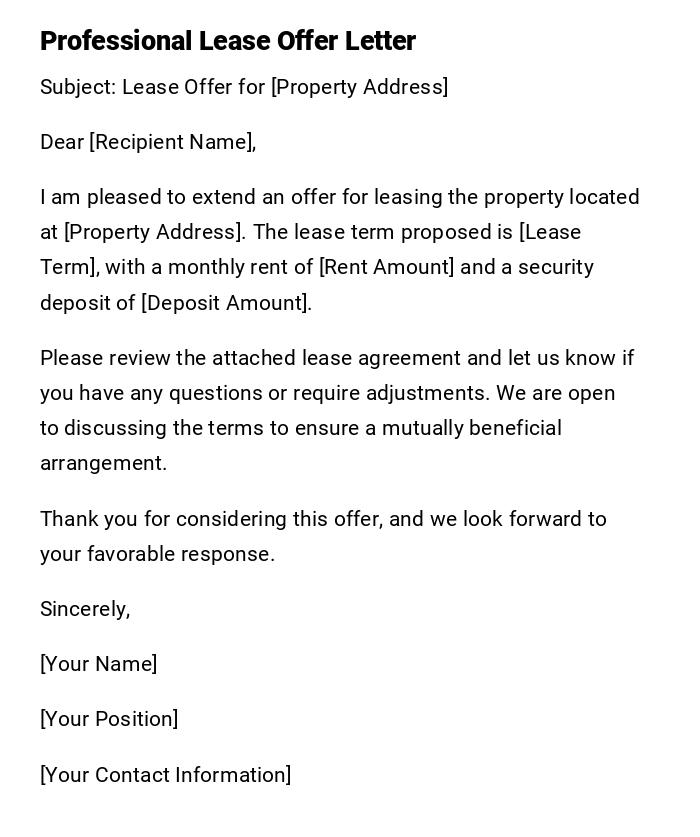
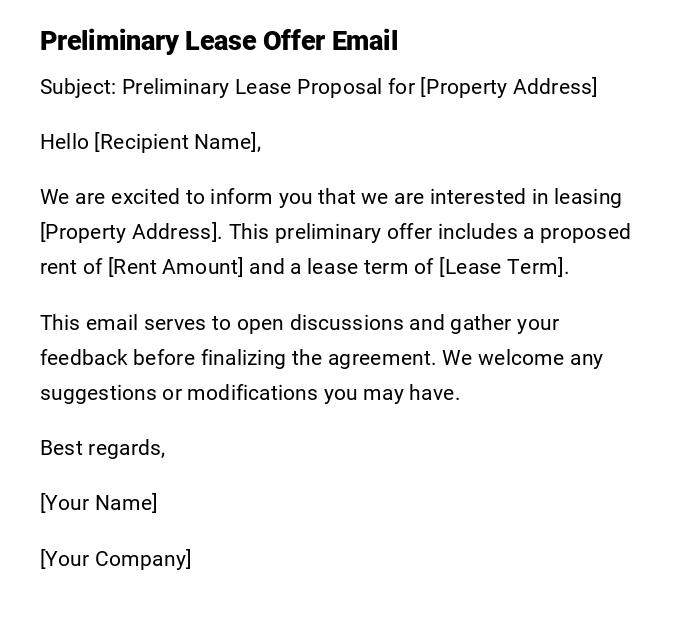
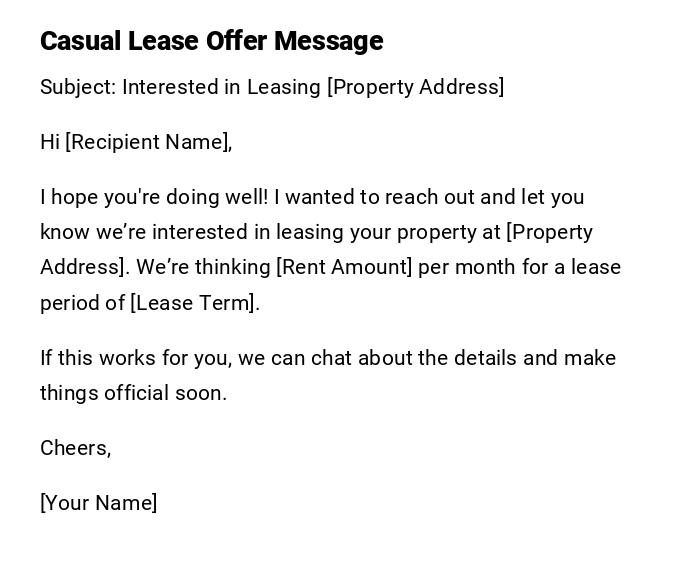
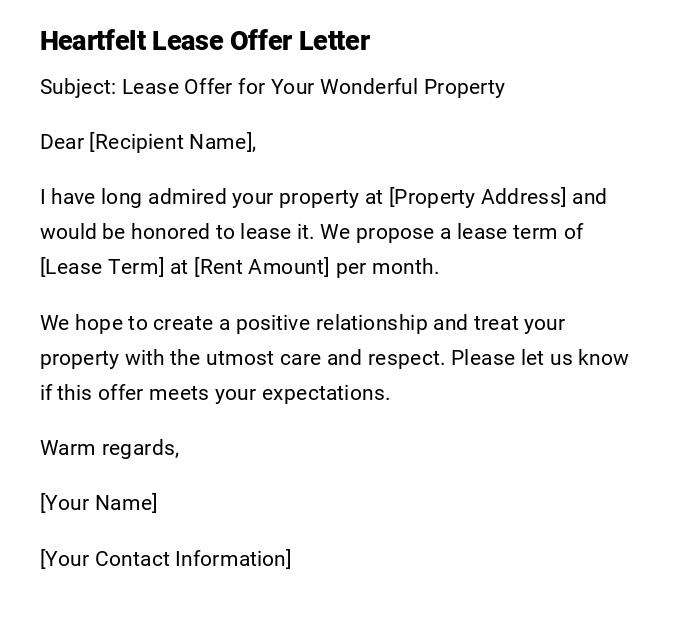
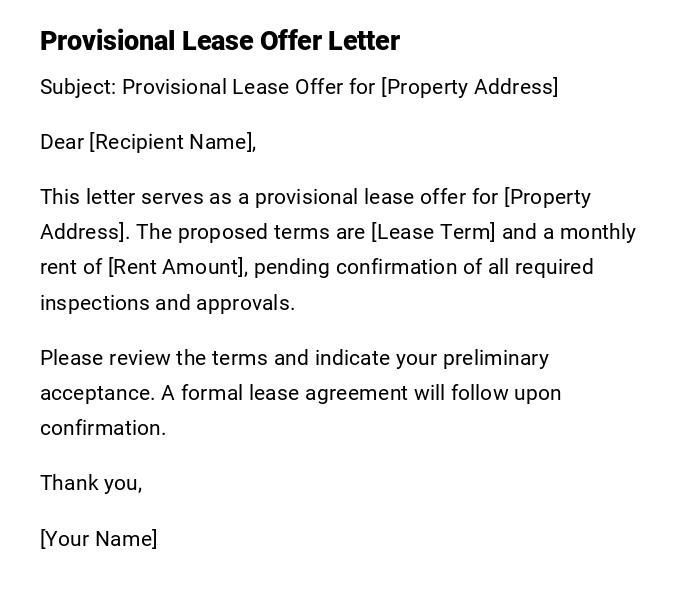
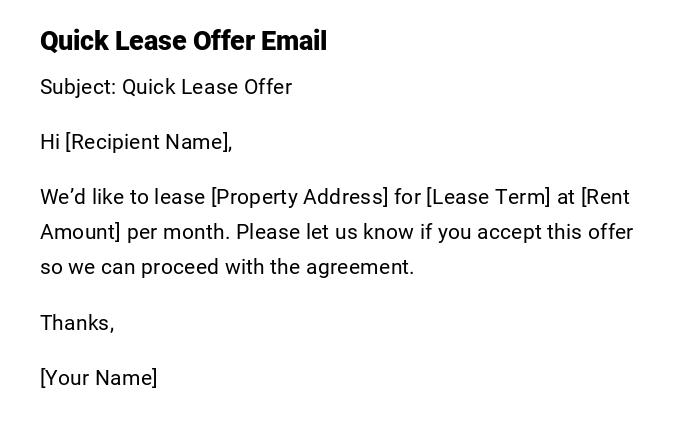

 Download Word Doc
Download Word Doc
 Download PDF
Download PDF